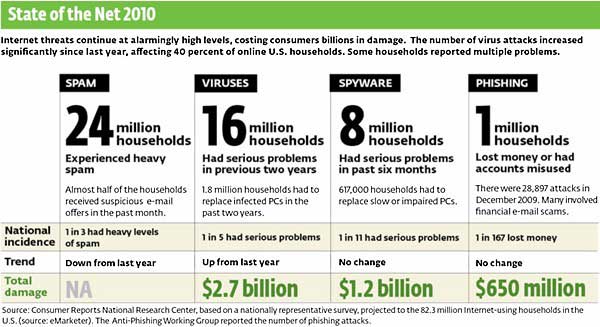Over one-half (52%) of adult Americans who use social networks, such as Facebook and MySpace, have posted risky personal information online, and 23% of Facebook users haven't used the site's privacy controls to protect themselves, according to a Consumer Reports study.
Moreover, some 9% of social network users say they have experienced some form of abuse in the past year, including malware infections, email scams, identity theft, and harassment, the study found.
Below, other findings from the 2010 Consumer Reports State of the Net study.
Risky Online Behavior
Many users of social network expose themselves to such risks by posting certain types of personal information, according to the study.
Among the adults surveyed who use social networks:
- 38% say they have posted their full birth date and year, exposing them to identify theft.
- 45% of those with children have posted names and photos of their children, potentially exposing the children to predators.
- 8% have posted their street address.
Among adults who use Facebook:
- 42% say they have posted their full birth date and year.
- 26% of Facebook users with children have posted names and photos of their children.
- 7% have posted their street address.
- 3% have disclosed when they were not home.
In addition, of the estimated 18.4 million adult Facebook users who use applications, such as games and quizzes, 38% say they are either confident the apps they use are secure or say they have not thought about it.
Meanwhile, a projected 1.8 million computers were infected via apps obtained through a social network in the past year.
US Internet Users
Among online adults, established threats, such as spyware and phishing email scams, persist at alarmingly high levels, and virus infections increased significantly since last year: 40% of online households surveyed reported having at least one virus infection in the past two years.

Overall, cybercrime cost American consumers $4.5 billion over the past two years and forced them to replace 2.1 million computers.
Looking for great digital marketing data? MarketingProfs reviewed hundreds of research sources to create our most recent Digital Marketing Factbook (May 2010), a 296-page compilation of data and 254 charts, covering email marketing, social media, search engine marketing, e-commerce, and mobile marketing. Also check out The State of Social Media Marketing, a 240-page original research report from MarketingProfs.
Other findings:
- 5.4 million online consumers submitted personal information to email (phishing) scammers during the past two years.
- A projected 1.7 million online households experienced online identity theft in the past year.
- There were 28,897 phishing attacks in December 2009 alone, many involving financial email scams.
About the data: Findings are based on a nationally representative survey of 2,000 online households, projected to an estimated 82.3 million Internet-using US households. The survey was conducted in January 2010 by the Consumer Reports National Research Center. An article highlighting study the findings appears in the June 2010 issue of Consumer Reports Magazine.



